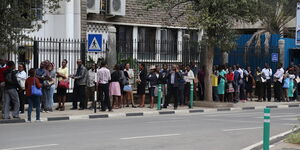Kenya Power and Lightning Company (KPLC) is in the preliminary stage of unveiling the use of foreign currencies to its customers.
The new payment system targets customers who are clearing their electricity bills, applying for new connections, obtaining Kenya Power Meters and using the token system.
Speaking on Monday, December 5, Kenya Power finance general manager, Stephen Vikiru, indicated that payment diversification was key to cushioning the firm from financial shock.
It would also help the utility firm show up in its foreign currency holdings despite earlier losses.
"Our electricity sales are 100 per cent in Kenya Shillings. Having Power Purchase Agreements in different currencies leaves us with foreign exchange risk," Vikiru told NTV.
The foreign currencies KPLC may adopt include dollars, euros and pounds.
However, Vikiru did not reveal if the company would change its payment modes after receiving a nod from the government.
"The impact of foreign exchange is that our loan book is about 90 per cent in foreign exchange.
"These are for reasons that 65 per cent of our loan book is on lend by bilateral guaranteed by the government and also based on the commercial debts that we have from significant projects that we have done by international organisations," Vikiru stated during an interview on NTV.
"But if you look at the re-evaluation of the loan book at the end of the year, that is when we realised foreign exchange losses are quite significant," he added.
Kenya Power took a significant hit from the depreciation of the Kenyan Shilling against the dollar.
The decline forced the sole electricity distributor to hike electricity in the country. Through a statement dated Friday, September 16, KPLC attributed the rise in the cost of buying tokens to inflation and adjustment of fuel costs in the country.
"Regulator adjusted the fuel cost and inflation components of the bill, hence the increase in the token price. This is done monthly by EPRA," their statement read in part.












